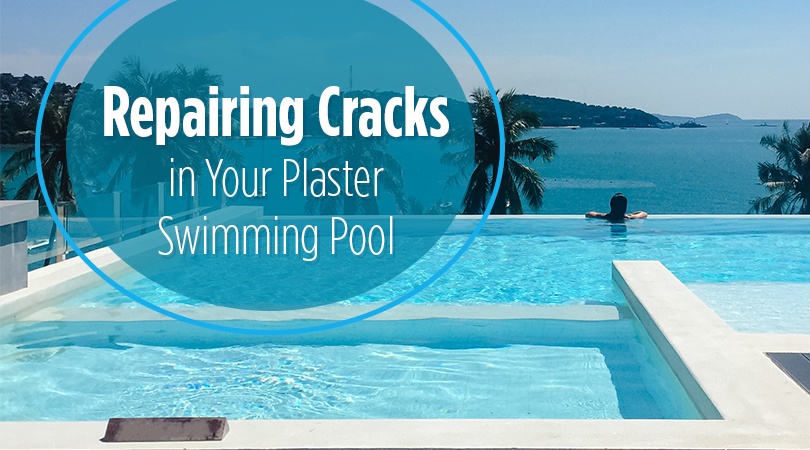
Classic white pool plaster is a mixture of water, white cement, white marble aggregate. Plaster pools have both functional and aesthetic purposes which make them a common choice for Florida installations. While white plaster is the most economical choice for gunite or concrete pool surfacing, there are multiple options to personalize the plaster making it a versatile material to consider.
Plaster is durable, but just like any material, it can begin to wither from age or poor pool maintenance. As cracks appear in your pool, you will need to determine the best way to repair the plaster.
When the pool surface is standard white plaster without additional elements, it is more susceptible to deterioration from pool water chemistry. The service life of the surface is typically 8 to 12 years.
You can strengthen the plaster by adding:
Whether standard white or combined with one of the items listed above, plaster makes your pool’s interior and pool water visually appealing. It’s important to the longevity of your pool that the plaster remains in good condition. The plaster’s durability will stop cracks from starting in some situations.
The best way to extend the life of your plaster pool and prevent cracks from developing is with consistent pool maintenance. Besides aging, there are several reasons damage can begin causing the plaster to crack.
Pool chemicals should frequently be checked to make sure your water’s pH level stays balanced. Acidic water can corrode some pool equipment as well as the plaster. Even when your swimming pool is not in use, such as during winter months, you can still have unbalanced pool water chemistry.
A pool leak can also cause your water pH levels to become unbalanced. A regular part of your swimming pool maintenance should include making sure you check for leaks.
Landscaping debris and other organic matter from trees, grass, leaves, plants, bark, and flower pollen can throw water balance out of whack. This includes fertilizer, especially those with iron.
Hurricane debris such as rocks or large tree limbs can damage the plaster directly in your swimming pool. To keep as much junk out of the swimming pool as you can, it’s a good idea to cover your pool and spa tub whenever they aren’t in use.
Shifting soil under the pool will be hard to identify. Hairline cracks defined as thin lines mostly close to the plaster surface can indicate a soil issue.
Repairing Cracks In Your Plaster Pool
When cracks occur, it’s best to treat them as soon as you identify them to help prevent more extensive issues from developing. Loosened plaster will look bad, but can also cause harm. Plaster can break-off and get into the filtration system.
If your plaster swimming pool is older and nearing the end of its lifespan, it might be time to add a new layer of paint. Painting is less expensive than replastering and can add a protective layer to prevent rough surfaces from developing. The right paint will also cover microscopic cracks before they become larger.
Begin by removing rough or loose particles from the edges of the cracks. You may need to use a hammer and chisel to tap away flaking plaster. Your goal is to get a space at least 1/4 inch deep for a repair to a larger area. Then use a damp sponge to clean away any debris that remains in the crack.
Next, read the directions for the materials you have chosen. You will want to make only the amount of plaster mix needed to repair the cracks. Stir in enough water to make the mixture look like mashed potatoes. To make sure you fill the crack in all the way use your fingers in a back-and-forth motion perpendicular to the cracks.
Apply heat to the plaster with an air gun or hairdryer. As the plaster dries, wipe off any excess plaster from the surface of the pool with a damp sponge. Working from the center of the patch outward, use a tool to even out the area until it matches the surrounding surfaces.
The best defense against your plaster pool developing cracks is consistent pool maintenance. Contact Aquaman Leak Detection at the first signs of leaks. Our experienced technicians will identify and repair your pool leaks to help keep your plaster pool looking its best for as long as possible. Contact us today to schedule your appointment.

With over 20 years of reputable experience finding leaks, owner Lowell Ball created a unique and patented leak detection system that accurately finds leaks without damaging property. We are so confident in our system and our workmanship, we offer the strongest warranty in the industry.
Aquaman Leak Detection Corporate
1275 South Patrick Dr, Suite A6
Satellite Beach, FL 32937
Owner Direct: 321.431.4784
844.766.5532 (844 POOL LEAK)
info@aquamanleakdetection.com
Office Hours:
9AM-6PM Mon-Fri
Emergency Service Available 24/7
Blog Comments